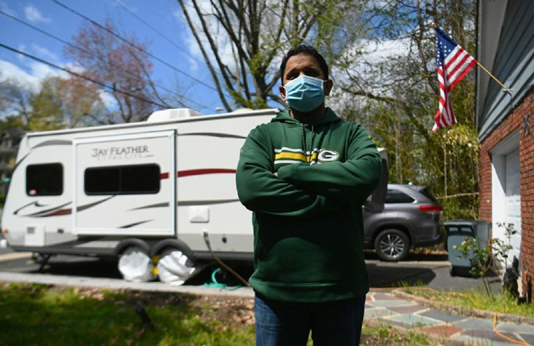NEW YORK, April 25, 2020 (BSS/AFP) – Anish Samuel, a doctor specializing
in pulmonary critical care, was changing his clothes multiple times an evening
and eating separately from his family to reduce the risk of spreading
coronavirus.
Life for Samuel, a fellow at St. Joseph’s University Medical Center in New
Jersey, was becoming untenable — but still, the risk remained.
Now Samuel is living in an RV in front of the family home. He moved into
his new digs days after his wife Jessica Ripnick-Samuel, who has asthma, gave
birth.
“Staying away from family is also hard. But I see them,” said Samuel, who
found his new living arrangement thanks to the volunteer group RVs 4 MDs.
The organization is helping connect health workers fearful of spreading
COVID-19 to their loved ones with camper owners who have a home on wheels to
spare.
Samuel told AFP it’s a better solution than one offered by his employer —
moving into a hotel room about 25 minutes away by car.
RV living is not a perfect option but it offers a semblance of normalcy,
Samuel said — it allows him to be close by in case of emergency, and of course
to see his newly expanded family.
“I would like to see them, even if it’s through a window or outside in the
backyard,” he said.
– ‘Fantastic idea’ –
The Facebook group RVs 4 MDs that started from scratch a month ago now has
more than 30,000 members.
The concept aims to help all essential workers who come into contact with
potentially infected patients, including Sal DePaola, a firefighter who lives
and works on Staten Island.
Sixteen people in his department have tested positive for the virus, and
DePaola doesn’t see how he could have prevented coming into contact with it.
For five weeks now, his only contact with his wife and children has been
through the window or door.
“It’s getting tougher as it goes because it’s been a long time,” DePaola
said.
“My kids are very difficult to handle.”
A similar situation is playing out in East Setauket, where a father of
three who works as a resident physician at Long Island Community Hospital is
living in Bud Conway’s RV.
“I thought it was a fantastic idea,” Conway said of his nearly 30-foot
(nine-meter) long vehicle. “All the county parks are closed so it sits in
storage.”
“So what am I doing with it? Let somebody use it.”
The doctor’s wife — who now is juggling three kids and two jobs on her
own, and wished to remain anonymous — said it’s a matter of boosting her
husband’s “morale.”
“I feel it’s helping him cope better,” she said.
“If he was in a hotel, he would be in complete isolation — he would go
from death and destruction at the hospital to an isolated hotel room, whereas
here, he’s coming home and his wife and kids are right here.”
– ‘See the world’ –
The RVs 4 MDs initiative is partnering with the platform RVshare, a
peer-to-peer RV rental organization with 60,000 members.
The platform is encouraging RV owners to rent them out at a low price or
lend them for free to first responders, including health care workers,
firefighters and police.
Long-term, it’s possible that campers could become a popular option for
travelers as coronavirus confinement measures are slowly lifted.
Moves by governors in several US states to progressively allow people to
move more freely saw reservations on RVshare jump 139 percent over the weekend,
in comparison to the one prior, mostly for dates in June and July.
Jon Gray, the head of RVshare, said even if Americans cannot take cruise
ships or planes in the coming months, or are hesitant to do so, “they’re still
going to want to get outside and see the world.”
Conway told the couple in East Setauket that they could use his RV as long
as they needed.
He also offered them its use for actual camping once they’re all reunited
— a vacation the kids are already plotting.



